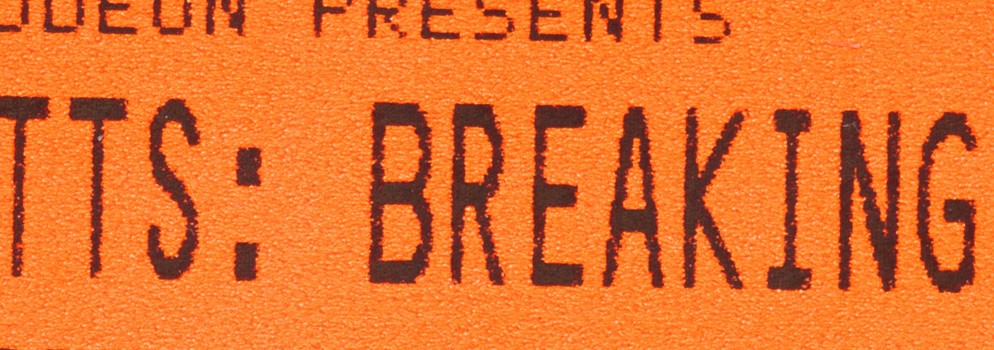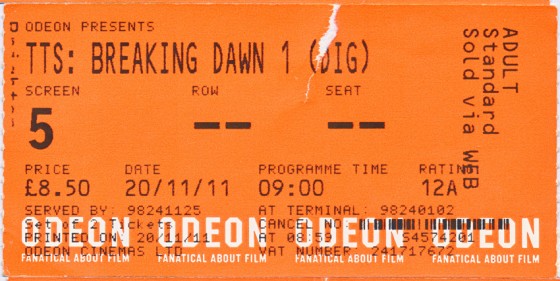Twilight: 3.1

A Styrofoam Cup of Blood
I apologize in advance for bothering to write an entire piece on Twilight 3.1. Originally this was to be an snide aside, subsumed into the earlier We Need to Talk About Kevin piece, but I was inspired (read annoyed) to do so by the following article. There are two options here, the second possibly worse than the first. If you don’t read French, I will translate. When ‘Bella arrive à prendre du pouvoir, mais par le mariage, la production d’un enfant et la mort’, (Bella does come to take her power, but from marriage, having a baby and death). There is thus a big difference between ‘Girl Power‘ (’empowerment’) and ‘Empowerment‘ (’empowerment’).
The second option is that you do read French.

Now, I totally support blaming Twilight series for the downfall of girls 9-15 everywhere. And I admire any balls-out (yep) feminist power argument. But halfway through Twilight 3.1, I began to suspect that this was in fact a weirdly feminist film. You may say that I have no right to say this, as I have a penis, but that’s getting into a tricky area, since women clearly should and do have the right to have penises. The reason that I have no right to say this is that it’s a completely idiotic argument.
Hasn’t stopped me before: action films are about the boy’s fantasy, flying around the city with webs that in a spider would come out your ass, but in this case come out of your arm for some reason, blowing stuff up, being aloof, and keeping as many hot girls on hold until you need to kiss them.
Twilight 3.1 is crap to be sure, but one could argue that this is no different than any action film, only that it switches the gender to which the fantasy is directed. The wedding scene, which seems to happen in real time, doesn’t contain plot points but visual details, secret feuds and quick glimpses of memory. That’s what the flowers would look like! I can’t believe she wore that. And that guy would say something at the toast; that was funny. But now I’m getting bored. Which is strange, since it’s technically my fantasy.
The shared dream running under either form of nonsense is not wanting to take responsibility for anything. In the boy version, it manifests in the villain who always stupidly draws his weapon at the end so you can shoot him ethically, even though the fantasy manifests the villain, the villain’s action, and two hot girls who are like totally into you. Oh, and also the murder. But, naturally, no responsibility or hard choices.
The girl version is even less interesting. Choice, risk, tension is to be avoided at all costs. Here Edward confesses that he is a killer, but…he’s kills serial killers. Bella ‘chooses’ to keep her baby, even though it would kill her to abort it (see anti-avortement, below), thereby rendering the choice moot. It manifests visually as the styrofoam cup that Edward puts blood in so Bella can survive. It’s not blood, so the characters seem to be saying, it’s a high-iron smoothie. In the girl version, it’s okay to live a world where you drink blood, where vampires and werewolves run around killing each other, but we wouldn’t want to hurt anyone’s feelings.
The price of this is narrative slackness. As Mlle. Frau-Meigs rightly argues ‘(Il y a) deux univers paradoxaux, normalement irréconciliables – les valeurs de la liberté des femmes et les valeurs de l’autorité masculine – dans un récit où l’héroïne ne choisit pas.‘ or ‘Belle has no actual power or ability, other than being cute and kind of bitch’. She doesn’t actually do anything. In fact the very point of four movies is that she doesn’t choose.
Having just seen the emasculated (yep) Frk. Noomi Rapace in the equally slack Sherlock Holmes: Game of Shadows, writing scenes for girls to sit there and have nothing to do isn’t anti-feminist, it’s just fucking boring. When are filmmakers going to realize: giving the woman power as the central figure in a narrative is the only way to further feminist agenda and make them super hot? How does anyone lose here? That’s feminism!
Right?
I should really get back to something safe, like making fun of Marxists. Or war heroes. Or babies.
Actually, I’m getting to that.
It would be easy to see my casual misogyny as an insult, since it probably is one, but even if you could divide a species into two exactly defined halves, let’s face it, boys aren’t really that much better. Girls are, justifyably, grossed out by the parts that we like, faces peeling, retributive gunshots, and competent narrative. Last cheap shot, I promise. The reality is what girls want is equally as foolish as what boys want, only without the ridiculous anger and inexplicable violence. But what makes for a shitty and nearly unliveable world makes for exciting cinema. And everyone agrees: a world filled with misery and war is a small price to pay for good storytelling. No, really. Look around you. Everyone actually does agree.
Upon walking out the ostensible PG‑13 version of a baby trying to eat its way out of its mother's womb, I immediately made an appointment for sex reassignment, just so I can have tubal ligation.
But please, let’s stop insulting Mlle. Frau-Meigs’ political agenda, and begin to insult her intelligence. Having finished off the anti-girl-pouvoir part, we reach the anti-avortement argument, which is just technically incorrect. First of all, name a film or television show since Maude – that’s right since Maude – where a character gets an abortion. Really. You can’t because there isn’t one. We’ve reached a very strange cultural point when Juno is considered edgy for doing something that every film character has ever done: kept her baby. (‘What are you rebelling against?’ ‘What kinda rebellion ya got?’). If the new Twilight movie is anti-abortion, then every movie ever made is.
Ah, right.
But there’s a second problem, which will bring us back to why this entire bit was to be an aside in the earlier piece. Having just seen a temporal double feature of We Need To Talk About Kevin, convincingly showing the guilt and powerlessness of the mother over her grown sociopathic child, and Twilight 3.1, which depicts having babies as the disgusting version of a David Cronenberg slug rape, I mean, I wasn’t going to have babies, but now I’m really really not going to have babies. Whatever Ms. Meyer thinks her agenda is, or says it is, or what Mlle. Frau-Meigs says she says it is, there is also her weird unconscious which, well, you know, wrote the damn books. Upon walking out the ostensible PG-13 version of a baby trying to eat its way out of its mother’s womb, I immediately made an appointment for sex reassignment, just so I can have tubal ligation.

Sunday. 9a. Bought tickets in advance. They had to open the theater just for us. We were right to do so. There were, like, three other people there.
Which leads us to our final illusion, one which Mlle. Frau-Meigs and I both share. In hers, watching the Twilight films transforms their target audience into the kind of passive robots that would, you know, pay good money to see Twilight films. After they traveled in time to see the first Twilight film of course. In mine, the visceral body horror and actual consequences of having kids depicted herein would send its audience to the nearest sterile-o-matic concession, whatever that is. Neither will happen because people pay money to see films, not the other way around (though how money would pay films to see people is lost on me). This is the kind of illusion that compels people to show The Boost or 28 Days to recovering drunks, an idea better served by showing The Green Hornet, the consequences of writing, acting in, editing, marketing, and forcing us to sit through a movie while high.
Even then it wouldn’t work. It’s possible to make the argument that films make people do stuff; they certainly make them keep paying for more films. But even if films do magically transform people into agenda zombies, we’re faced with the same problem. We fantasize about rewriting, editing and censoring films because it seems a practical way to transform all those people who just plain refuse to do what we want, even if we did pay a thousand bucks for Final Cut Pro. But in order to do that, we have to acknowledge that films don’t arise sui generis, like flies from The Green Hornet. No, they’re made by people, whose minds we’d have to change…by showing them films? And so, in our zealous righteous blindness, Mlle. Frau-Meigs and I are both idiots. And that’s feminism.
Did I get it right that time?
The Take

$3.50
The Lonely Comments Section

 [logo]
[logo]